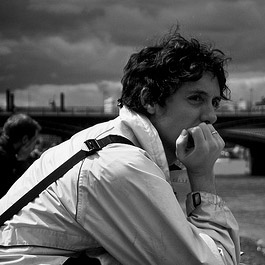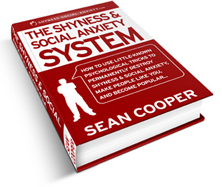Is Thinking Too Much Keeping You Shy?

You’re back in high school. The teacher you hate most has just asked you a question. Typical of her to pick the only one you don’t know the answer to.
Suddenly, your mind goes blank.
What do you do? You desperately try to think of something to say, and an awkward silence falls across the class. They’re all looking at you. Everybody’s watching.
Suddenly you’re not sure where you should put your hands. You move them awkwardly to the back edge of your desk, and you feel how cold and sweaty they are. But there’s no time to worry about that. You have to say something, anything. Quick!
You blurt out an answer. Why does your voice sound so weird? Everyone keeps looking at you for some reason. Now your voice sounds a little better. You wish the teacher would move on with the other people in the class…
What Did You Do Wrong?
Maybe that situation has happened to you before. Maybe it’s happened to you many times. Or maybe some other, similar situation has happened. It’s happened to me, and it happens to most people who are shy, for a reason.
The reason is shy people tend be preoccupied about what other people think of them. In the classroom, you were very aware that everyone was watching you. You didn’t want to mess up.
You didn’t want other people to get the wrong impression of you, so you had to think carefully about what you were going to say or do next. Unfortunately, your plan backfired horribly.
You Fell Into A Trap
It’s a trap many shy people get caught up in: they try to micro-manage what other people think of them. They constantly think about little things that are unimportant.
For example: Is what you say next going to be liked? Are your clothes representative of your personality? Will the way you walk give off the right vibe? What’s the right body language? Will doing this or that make you seem less smart? Do people secretly respect the way you are?
This is the process shy people go through before they say or do something:
- “What should I say next?”
- “Will it sound good?”
- “What’s the best way to say it?”
- …and only then do they actually say it.
This type of thinking is called Self-Monitoring, and it’s bad for several reasons:
1. You Hesitate
Instead of just letting go and expressing yourself, you think and think and think. And only after do you do something. It’s not fun for you and it’s not fun for other people. It’s unnatural. The more you hesitate before doing something, the more contrived it will seem when you finally do.
For example, if you think of something to say, and them wonder if you should say it, you get nervous. It stops becoming something that just popped into your head and becomes YOUR own idea. You put more and more importance on how people will react to it the longer you wait. When you finally do say it, you’re nervous. You control how your act through conscious effort, and it comes out unnatural.
2. You Seem Out Of Focus
When you Self-Monitor, you seem out of focus. Like you’re actually 10 seconds in the past or 10 seconds in the future, instead of being in the NOW and enjoying it.
Only shy people and those who are extremely self-conscious monitor what they do. Normal people don’t. What normal people do, is not think at all. They don’t think about what they’re going to say next. They get a general feeling of what they want to communicate, and they say it.
Think back to one of your best experiences socially. Chances are, it felt like the right words were somehow coming out of your mouth automatically. You weren’t stuck in your head, trying to come up with something to say. It was all flowing, and you felt in the moment and connected to the other person. Best of all, you were having fun.
3. You Seem Inauthentic
Oh, the irony. You want people to like you and think you’re a swell guy or girl, but they don’t. They think you’re inauthentic.
When you think about everything you say and do, it doesn’t come from you directly. It’s been filtered by your brain, and people can feel it. They can sense the slight offness when you’ve been thinking of a remark for a minute. They don’t feel the same energy coming from you as from a person who comes up with something to say on the spot, and that lack of energy turns them off.
How Do You Stop Self-Monitoring?
First, you have to realize when you’re doing it. You do it when you’re trying to consciously control internal processes that are normally unconscious. What does that mean?
Do you control how you move your mouth when you talk? Do you consciously control how you’re breathing? Do you think about how your arms and legs move as you walk or sit down? Maybe you aren’t doing it now, but in tough social situations you do it. You shouldn’t EVER do this.
When you realize you are doing any of these things, this is what you should do:
Switch your focus. Think about being on the beach. Count to one hundred. Think of something that will take you mind completely off what you’re doing physically.
Stop talking to yourself. If you’re constantly doing this in your head, stop. It’s part of Self-Monitoring. You’re probably talking to yourself about what you’re doing, or about to do. Switch your focus using the technique I just showed you.
Don’t hesitate. When a thought pops into your head, express it. The longer you wait the worse your fear of expressing it badly becomes. Downplay. You could be in a war zone right now. You’re just talking to someone, maybe it’s your teacher.
These things should come naturally. So don’t consciously force your mouth to move when you’re talking Or your arms to move a certain way when you’re walking. Switch your focus, relax, and have fun.
The Blueprint
- Realize when you’re self-monitoring
- Switch your focus off yourself.
- Stop talking to yourself.
- Don’t hesitate for a second.
Yours in Social Success,
Sean Cooper

Sign Up For Your FREE Member Newsletter
Liked This Article? Enter your email below to get my latest strategies and tactics on overcoming shyness and social anxiety sent straight to your inbox.
When you sign up, you'll also get instant access to a free report I wrote called "The 3 Biggest Mistakes Shy and Socially Anxious People Make."





